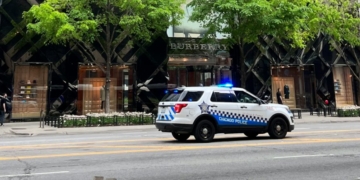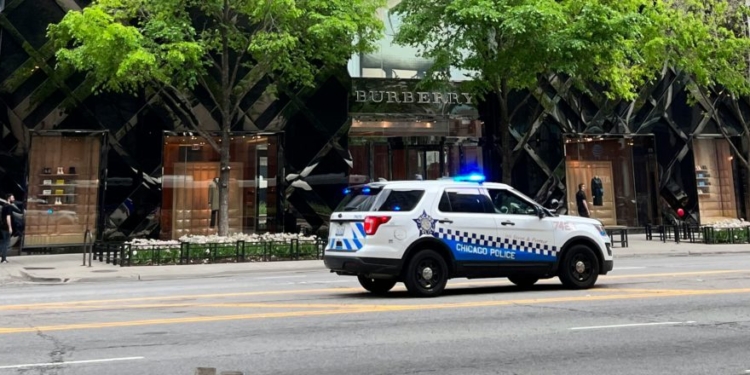Chicago announced a freeze on hiring government workers Monday, piling on difficulties for an overburdened and understaffed police department that is currently battling the city’s crime epidemic.
Democratic Chicago Mayor Brandon Johnson’s administration aims to make up a $982.4 million shortfall in the city budget projected for fiscal year 2025 with the freeze, which includes the Chicago Police Department (CPD) and Fire Department, according to the Chicago Sun-Times. Meanwhile, the CPD is already grappling with staffing shortages under Democratic leadership in the city alongside rising crime and record-low arrests, according to multiple reports.
“It’s very clear the Johnson administration has been hostile to the police,” Manhattan Institute Public Safety Fellow Rafael Mangual told the Daily Caller News Foundation. “That was the center of his campaign. He has positioned himself as an antagonist of the police department, so it’s not at all surprising that he would take this step.”
Johnson pledged during his 2023 mayoral campaign to not “defund police” and instead pushed for “smart police,” according to ABC 7. The pledge signals a reversal of Johnson’s position in 2020 following the George Floyd riots, where he said that it was his “political goal” to defund police, according to a 2020 interview on the Santita Jackson Show.
CPD Superintendent Larry Snelling said in May that the department was down “close to 2,000 officers,” calling the shortage a “huge concern” ahead of the Democratic National Convention, according to CBS. Johnson slashed 833 street police jobs in the 2024 budget during his first year in office, with the force having 1,600 fewer officers than when former Democratic Chicago Mayor Lori Lightfoot began her tenure in office, according to the Illinois Policy Institute.
“There’s this massive understaffing problem that the Chicago Police Department has been dealing with over the last several years, which leads to officers getting onto their shifts with backlogs on 911 calls, and those backlogs aren’t cleared by the time that those shifts are over,” Mangual told the DCNF. “And that’s a trend that we’ve seen throughout the Chicago Police Department for quite a while, so this is a really serious issue.”
Police set a record for overtime hours in 2023, jumping from just over 1.4 million hours in 2022 to a staggering 4.5 million hours in 2023, according to CBS. The extra pay for overtime ended up costing the taxpayers nearly $300 million.
“You don’t want tired cops or burnt-out cops on the beat; you want your cops to be fresh,” Mangual told the DCNF. “You want them to have the ability to do their best work, and that’s going to be hard to the extent that they’re being asked to work longer hours because [The CPD] just don’t have enough officers to go around.”
Reports of burnout from excessive hours among CPD officers emerged as early as 2022, with shifts stretching for up to 12 hours with no days off, in some cases, for weeks, according to CBS Chicago. Former CPD officer Amy Hurley told CBS Chicago that after the George Floyd riots in 2020, her hours became longer and her days off were cancelled regularly.
“You’re like a zombie,” Hurley told CBS Chicago. “You’re not even coherent. You’re kind of just going through motions.”
As the CPD’s forces continue to struggle with numbers, crime continues to plague Chicago with multiple metrics on the rise from 2022 to 2023.
Just 10.8% of violent crimes committed resulted in an arrest in 2023, while violent crime increased by 11.5% from 2022 to 2023, according to the Illinois Policy Institute in March. Meanwhile, robberies increased 23% from 2022 to 2023, and motor vehicle theft increased by 37% in the same time frame, according to 2023 CPD year-end data.
“There’s a sense that there is a high likelihood [a criminal] will not be caught if they commit a crime, which falls under the purview of the staffing issues that Chicago police are currently experiencing,” Zack Smith, a Heritage Foundation senior legal fellow, told the DCNF. “And then there’s a sense as well that if they are caught, there won’t be consequences for those crimes they’ve committed.”
The normalization of face coverings from the COVID-19 pandemic makes video evidence harder to use and may depress the rates at which charges are levied against perpetrators, commonly referred to as clearance rates, according to Mangual.
“To the extent that suspects or offenses were captured on film, it was more difficult to identify the perpetrators,” Mangual said. “More and more people masked up. So I think that was certainly part of this kind of the post-2020 phenomenon with respect to clearance rates.”
Chicago’s homicide count was the highest out of American cities in 2023, with 617 total homicides compared to the next highest, Philadelphia, which clocked in 408 homicides. While the murder rate in Chicago fell 12% in 2023, the rate remains higher than it was nearly a decade ago.
There have been 401 homicides in Chicago so far in 2024, according to the Chicago Tribune.
“If Brandon Johnson, or any politician, continues to adhere to the soft-on-crime policies that he and others have supported so far, Chicago will continue to experience high violent crime rates,” Smith told the DCNF. “We know what works to combat violent crime, it’s to put more police officers on the street, empower them to do their jobs responsibly, and then prosecute people who break the law and hold them accountable.”
The Chicago Police directed the DCNF’s request for comment to the mayor’s press office. The mayor’s office did not respond to multiple requests for comment.
(Featured Image Media Credit: niramay-kachhadiya/Unsplash)
All content created by the Daily Caller News Foundation, an independent and nonpartisan newswire service, is available without charge to any legitimate news publisher that can provide a large audience. All republished articles must include our logo, our reporter’s byline and their DCNF affiliation. For any questions about our guidelines or partnering with us, please contact [email protected].



























 Continue with Google
Continue with Google